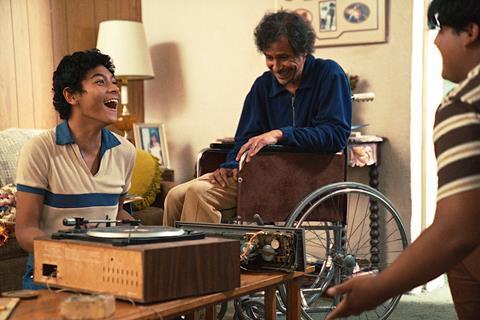Warm-hearted drama from the director of ‘Duck Season’ is set in New Mexico in the 1970s

Dir: Fernando Eimbcke. US/Mexico. 2025. 84mins
A bittersweet and deceptively slight family drama set in late ’70s New Mexico, Fernando Eimbcke’s fourth feature Olmo shows that, 20 years on from his multiple award-winning debut Duck Season, the Mexican director retains his stylistic hallmarks. Spare, minimalist treatment, compassion and wry, deadpan humour define this story about the tragicomic efforts of the titular teenager to make his way, against all the odds, to a party.
A loving homage to an era
The first project to emerge from Plan B’s recently launched micro-budget film financing initiative, Olmo, which premieres in Berlin’s Panorama and has dialogue in both Spanish and English, deserves to travel beyond the US indie and Latin American markets which are its natural home.
The film is set in 1979, in a New Mexico town iconically defined by establishing shots of a glinting sun, dusty roads, freight trains and neon signs. Fourteen-year-old Olmo (Aivan Uttapa) lives with his bedridden father Nestor (Gustavo Sanchez Parra, best known to international viewers from his turn as the dog handler in Amores Perros), who has MS; long-suffering mother Cecilia (Andrea Suarez Paz); and hard-smoking, fast-mouthed sister Ana (Rosa Armendariz).
The intro sequence, a cleverly done homage to late 70s music videos, reveals that Olmo has a crush on Nina (Melanie Frometa), who lives in the house opposite. “We saw Freaky Friday together,” Olmo complains to his sidekick Miguel (Diego Olmedo), “and now she ignores me.” Miguel’s cool Tony Lama boots are one of several running jokes.
Early scenes are, if occasionally over-extended, an affectionate portrait of the family’s challenging, messy existence. Not much happens, but it does so entertainingly: Nestor’s mattress needs to be changed, which brings the whole family into co-ordinated play. They owe three months’ rent, so Cecilia has to go to work on a Saturday and Olmo will have to look after Nestor. But this is precisely the evening that Nina invites him and Miguel to a party – a dream come true for them both.
Olmo diligently sets about trying to get out of looking after Nestor by seeking help from his supercool Uncle Julio (Valentin Mexico), who offers to stand in before arguing with Nestor and promptly disappearing again. Another fun scene has Olmo and Miguel desperately trying to fix the stereo they need to take to the party while Nestor, rather than just fixing it himself, frustratingly insists on turning it into an electronics class. The deadpan comedy moves into a more surreal, poetic register when the boys do finally manage to get away – but they end up wandering into a nearby wake. Olmo and Miguel listen respectfully to a guitar and voice version of Cuco Sanchez’s sorrowful ranchera classic ‘Bed of Stone’, and Olmo has a shocking vision of Nestor sitting up from the coffin – the prelude to the film’s more sombre final stretch.
A drama about immigrants, Olmo wears its politics lightly, preferring to stand as a film about a family who happen to be immigrants. Scriptwriters Eimbcke and Vanesa Garnica clearly love their characters, to the extent that, in a film which is so good at evoking its place and time, you sense they’re drawing on direct memory. Nestor wears the humiliations of his MS with resignation but, via sometimes cruel little acts of revenge against the world, he still finds ways of exercising his power. Cecilia comes across as a dignified, exemplary combination of resilience and kindness, though with a tinge of sadness.
As Olmo, Uttapa is tough and pragmatic in a world in which everything – stereos, girls, cars, and indeed his own father – are breaking down all the time. It’s Olmo’s dreams that keep him going – dreams not only of Mina, but the fabulous American dream of riding a fast car along a dusty highway. Lots of other such little details abound in this loving homage to an era, all carefully bathed in natural light by DoP Carolina Costa. Radio music, mostly snatches of period Mexican pop and disco songs, is practically omnipresent and key to the characters’ lives – though space is also unexpectedly reserved for Slade’s raucous 1973 hit ‘Cum on Feel the Noize’.
Production companies: Plan B Entertainment, Teorema
International sales: Film Constellation Edward@filmconstellation.com / North American sales: CAA, filmsales@caa.com
Producers: Dede Gardner, Jeremy Kleiner, Erendira Nunez Larios, Michel Franco
Screenplay: Fernando Eimbcke, Vanesa Garnica
Cinematography: Carolina Costa
Production design: Lorus Allen
Editing: Mariana Rodríguez
Music: Giosue Greco
Main cast: Aivan Uttapa, Gustavo Sanchez Parra, Diego Olmedo, Andrea Suárez Paz, Rosa Armendariz, Valentin Mexico
























